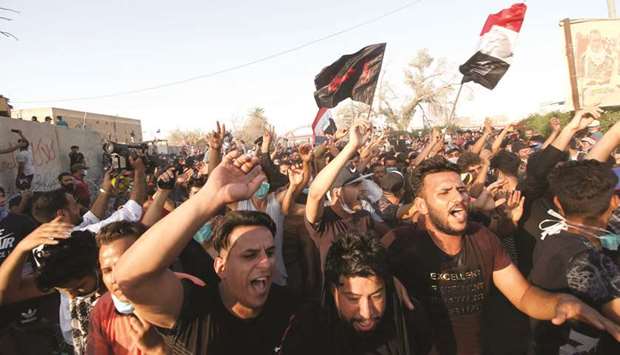Iraq’s main seaport closed down yesterday following clashes between protestors and security forces in the nearby southern city of Basra in which one demonstrator died and 25 were injured the previous night.
Several hundred protesters took to Basra’s streets again yesterday afternoon.
As they demonstrated, the provincial government headquarters — the centre of protests in recent days — was engulfed in flames, local police and army sources said.
However, no protesters were near the building when the fire broke out, the sources said, adding that the sound of a blast had been heard beforehand.
Southern Iraq has erupted in unrest in recent weeks as protesters express rage over collapsing infrastructure, power cuts and corruption.
Port employees said that all operations had ceased yesterday morning at Umm Qasr port — the main lifeline for grain and other commodity imports that feed the country — after protestors blocked the entrance. Trucks and staff were unable to get in or out of the complex.
Oil exports, which are handled at offshore terminals, remained untouched by the unrest.
Officials announced a citywide curfew would be in place after 3pm local time, but cancelled it just as it was due to come into force.
A senior security source told Reuters that a heavy deployment of security forces — including members of the rapid response team — would be on patrol in Basra to enforce the curfew and impose calm.
Residents in Basra, a city of more than 2mn people, say the water supply has become contaminated with salt, making them vulnerable and desperate in the hot summer months. Hundreds of people have been hospitalised from drinking it.
A Health Ministry spokesman told a news conference in Baghdad that 6,280 people had been recently hospitalised with diarrhoea due to the oversalinated water.
The protesters began blocking the entrance to Umm Qasr port, which lies about 60km from Basra, on Wednesday night.
They also blocked the highway from Basra to Baghdad and set fire to a provincial government building.
Public anger has grown at a time when politicians are struggling to form a new government after an inconclusive parliamentary election in May.
Residents of the south complain of decades of neglect in the region that produces the bulk of Iraq’s oil wealth.
The Basra head of Iraq’s Commission for Human Rights, Mahdi al-Tamimi, called for an immediate investigation into the protesters’ deaths, adding that most of the victims had been shot.

Iraqis protest near government building in Basra yesterday.
